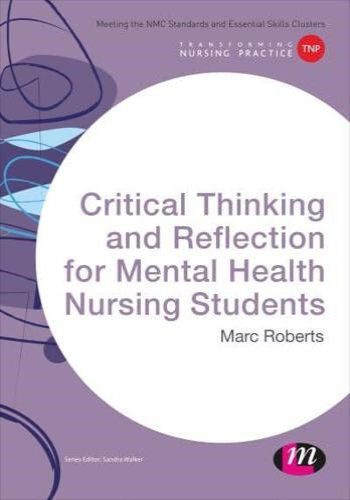Chapter 1: Introduction to Critical Thinking and Reflection
* Summary: Defines critical thinking and reflection in the context of mental health nursing. Discusses the importance of these skills for providing effective and compassionate care.
* Example: A nurse critically thinks about a patient's withdrawn behavior and reflects on her own biases, considering the cultural context of the patient's behavior.
Chapter 2: The Critical Thinking Process
* Summary: Introduces the steps involved in critical thinking, including questioning assumptions, analyzing evidence, and evaluating outcomes. Provides a framework for nurses to use in making sound clinical decisions.
* Example: A nurse uses critical thinking to determine the underlying causes of a patient's aggression, considering both biological and environmental factors.
Chapter 3: Reflective Practice
* Summary: Examines the concept of reflection and its role in professional development. Introduces different models of reflection, such as Gibbs' Reflective Cycle.
* Example: A nurse reflects on an interaction with a suicidal patient, identifying areas for improvement in her communication and support strategies.
Chapter 4: Critical Thinking and Assessment
* Summary: Explores the application of critical thinking to mental health assessment. Provides techniques for gathering and interpreting information to develop accurate diagnoses and treatment plans.
* Example: A nurse critically examines a patient's history and symptoms to rule out potential differential diagnoses before making a definitive diagnosis.
Chapter 5: Critical Thinking and Intervention
* Summary: Discusses the role of critical thinking in planning and implementing interventions for mental health patients. Emphasizes the need for evidence-based practices and tailoring interventions to individual patient needs.
* Example: A nurse develops a tailored intervention plan for a patient with depression, considering the patient's preferences, cultural background, and previous treatment experiences.
Chapter 6: Critical Thinking and Evaluation
* Summary: Examines the process of evaluating the outcomes of interventions and making adjustments as needed. Introduces tools and techniques for monitoring patient progress and assessing the efficacy of treatment.
* Example: A nurse uses outcome measures to track a patient's response to therapy and adjusts the treatment plan based on the patient's feedback and progress.
Chapter 7: Critical Thinking in Ethical and Legal Issues
* Summary: Explores the ethical and legal considerations involved in mental health nursing. Discusses the nurse's role in protecting patient rights, maintaining confidentiality, and making decisions in complex situations.
* Example: A nurse critically examines the ethical implications of a proposed treatment plan for a patient with a dual diagnosis of substance use disorder and mental illness.
Chapter 8: Critical Thinking and Interprofessional Collaboration
* Summary: Emphasizes the importance of critical thinking in interprofessional collaboration. Provides strategies for effectively communicating with other healthcare professionals and working together to provide comprehensive care for patients.
* Example: A nurse collaborates with a psychiatrist to develop a treatment plan for a patient with psychosis, considering the patient's medical and psychological needs.







